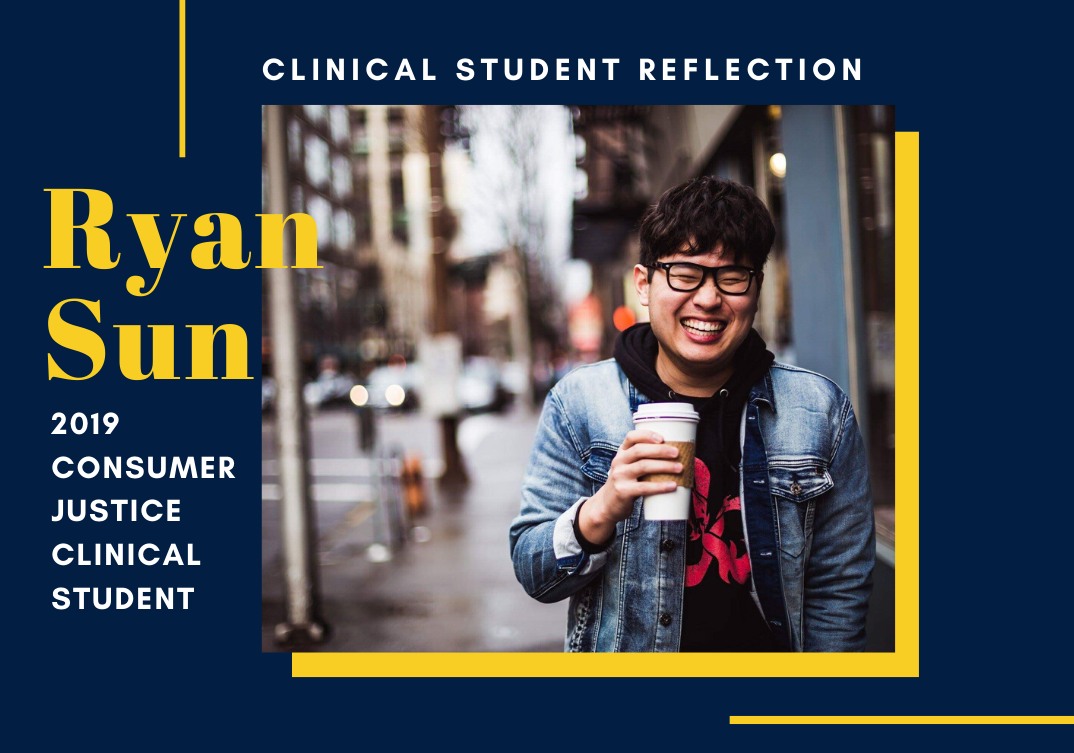
As my fellow Berkeley Law graduates and I close this chapter of our lives, we are reminded to appreciate the pillars of support that helped us make it to the end. For me, the Consumer Justice Clinic and the wider East Bay Community Law Center (“EBCLC”) community were some of those pillars. Because I am presumably supposed to have come out of these three years somewhat wiser as well, I would like to share three lessons that clinic has taught me.
Lesson #1: Don’t be afraid to change your plans in law school (or in life).
My time in clinic came as a surprise to me. When I started law school, I could not have imagined being involved in any clinical work, certainly not one as heavily involved in direct client services as EBCLC is. I had just come from working as a legal assistant in a large law firm, and my plan, as I’m sure many law school plans are, was based largely on the TV show Suits. The prestige of working on the top floor of a shiny office building was tempting, especially for someone who grew up with first-generation immigrant parents. That was where they had been told American dreams were realized. Clinical work was not included in that plan. Luckily, I am extremely susceptible to peer pressure, and a fellow law student, Sydney Royer, was kind enough to push me to try something outside of my comfort zone. Having had close to no social justice work under my belt at that point, I decided to apply for the clinic that I felt would give me the broadest base of experience in the field, the Consumer Justice Clinic at EBCLC. It turns out this was a wonderful decision, and, no offense to the “school” part of “law school,” the best learning experience I could have asked for.
Lesson #2: The legal system needs fixing—maybe this one’s too obvious.
While I could wax poetic about how amazing of a clinical worker I was, I usually think of that in the same vein as telling people about how great my semester abroad during my junior year of college was: questionably true and mildly tedious. It has always been far more impactful for me to think about how working in clinic has made me re-evaluate my own world views. Those immigrant parents I mentioned a few sentences ago had come to the United States with nothing, and by the time my sister and I were growing up, they had landed us solidly in the middle class. With that privilege came an ignorance of the law, at least in terms of how it affected certain groups of people. For me, the law was something to be followed, a protective friend at best and a trivial inconvenience at worst.
But I quickly learned that the law is less friendly than Schoolhouse Rock portrayed it to be. My very first client meeting was with an elderly Black woman who was being harassed by debt collectors for credit she had taken out to support her daughter and her grandchildren. She expressed to us her fears of being sued, of not being able to afford to drive her grandkids to school, and of not being able to support her family under one roof. But she also mentioned her frustrations in dealing with administrative agencies over things like her car being towed or her attempts to get state-provided assistance for living expenses. I realized then that despite the fact I had been diligently attending my administrative law class, I probably had less actual knowledge of how it worked than this woman who was looking to me for help. Access to the law is a double-edged sword. On one hand, it means certain people do not have access to the legal remedies that should rightfully be theirs, whether because of a lack of knowledge, poor access to legal resources, or just deficiencies in the law itself. On the other hand, many of those same people are forced to interact with the law on a daily basis, but that “access” is only as good as the system in place. Which is to say, terrible.
Luckily EBCLC did not leave me to wallow in the despair of my new-found knowledge. While much of the work I did in the Consumer Justice Clinic was meant to even the odds of an unfair system, the clinic, and EBCLC at large, was also committed to changing the system itself. For every debt defense litigation we helped with, there was also a consumer protection bill we worked on to get passed. Even so, I cannot count the number of times I had to tell a client that the law did not always lead to the most just outcome. In truth, I was stunned by the optimism towards the law that some of our clients felt, despite being abandoned again and again. And still with everything that I’ve learned, some of that optimism seems to have rubbed off on me. Even for those pushed to the periphery, there is a vision of the law as justice, and that vision becomes a little clearer each day because of organizations like EBCLC and the people who work to create that reality.
Lesson #3: Strength in community.
Perhaps it is made easier by the shared values that students and staff usually come into the clinic with, but the sense of community I felt walking into the clinic, and now walking out, continues to be inspiring. Maybe the rigor of the work attracts those with empathy at their core. Maybe there is an unspoken drive to show clients a face of the legal industry that defies their pessimistic expectations. Maybe everyone I met just happened to be kind. Whatever the reason, I am now leaving law school with a network of people who have been, and will continue to be, friends, mentors, and family.
“We give testimony. Our noise is dangerous.” – Janice Mirikitani